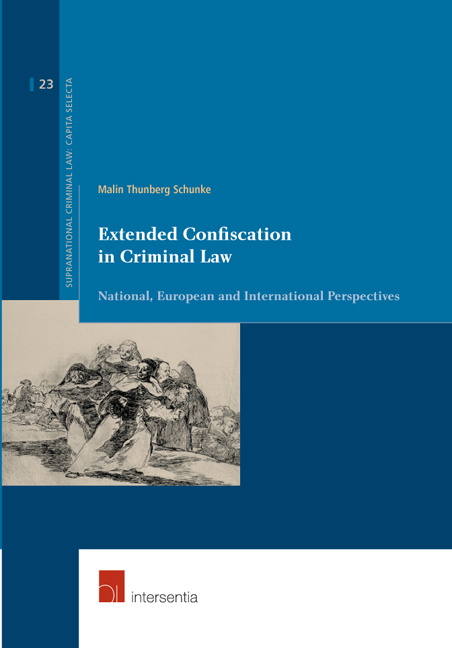Book contents
- Frontmatter
- Preface
- Contents
- Table of Cases
- List of Abbreviations
- Part I Introduction
- Part II Substantive Provisions on Extended Confiscation
- Part III The Legal Framework for International Cooperation
- Chapter 8 International Cooperation in the Area of Confiscation
- Chapter 9 Cross-Border Asset Tracing and Exchange of Information
- Chapter 10 International Cooperation in Order to Seize or Freeze Assets
- Chapter 11 International Cooperation in Order to Execute Final Confiscation Orders
- Chapter 12 The Proposal for a Regulation on Mutual Recognition
- Chapter 13 Final Remarks: “To Go for the Money” – But How?
- Bibliography
- Index
- About the Author
Chapter 9 - Cross-Border Asset Tracing and Exchange of Information
from Part III - The Legal Framework for International Cooperation
Published online by Cambridge University Press: 11 October 2018
- Frontmatter
- Preface
- Contents
- Table of Cases
- List of Abbreviations
- Part I Introduction
- Part II Substantive Provisions on Extended Confiscation
- Part III The Legal Framework for International Cooperation
- Chapter 8 International Cooperation in the Area of Confiscation
- Chapter 9 Cross-Border Asset Tracing and Exchange of Information
- Chapter 10 International Cooperation in Order to Seize or Freeze Assets
- Chapter 11 International Cooperation in Order to Execute Final Confiscation Orders
- Chapter 12 The Proposal for a Regulation on Mutual Recognition
- Chapter 13 Final Remarks: “To Go for the Money” – But How?
- Bibliography
- Index
- About the Author
Summary
THE LEGAL FRAMEWORK
REQUESTS WITHIN THE FRAMEWORK OF INTERNATIONAL POLICE COOPERATION
During the investigative stage any assets must be identified, searched for, located and documented. This is a multifaceted activity with overlapping objectives as criminal assets must not only be found, but it may also be necessary to acquire sufficient evidence to link the asset to an unlawful activity or to the criminal offence. A request for assistance at the investigative stage may be of varied character, but common requests concern for example:
– to obtain information on whether any assets are present in another State,
– to trace and search for specific assets abroad, and/or
– to gather evidence needed to support a confiscation order.
The tracing of criminal assets is not an easy task in itself, and there is a significant need for specialised and trained units:
the multiple forms assets can take means that investigators must have an understanding of a wide range of spheres, including financial markets, corporate and commercial structures, banking practices, property and insolvency law, and online currencies in order to successfully trace the path of a converted asset.
Financial investigations are conducted by different authorities, for example police forces, prosecutors or investigating magistrates. These authorities may need access to different types of information regarding property, for example land registers, company registers, records on vehicles and data from insurance companies or tax authorities. Transnational exchange of information or intelligence in confiscation cases may take place in many different ways, but a significant part of the initial investigation takes place within the framework of international cooperation between police forces. Often it is possible to directly share intelligence or data which is legally available to the agencies through domestic databases. There are currently numerous channels for informal and formal police-cooperation, which may be used in order to search for assets abroad. Examples are liaison officers, Europol, Interpol or the CARIN network. The specialised framework of the national asset recovery offices set up by the FD on Asset Recovery Offices is also an important cooperation channel.
- Type
- Chapter
- Information
- Extended Confiscation in Criminal LawNational, European and International Perspectives, pp. 237 - 262Publisher: IntersentiaPrint publication year: 2017



